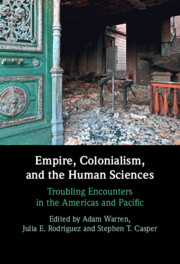Acknowledgments
This book is the written manifestation of a long conversation among friends. We envisioned it, wrote it, and edited it digitally on lands now long occupied and often unceded. In both the meetings leading up to its publication and the book now in front of you, we strove to create a new approach to the history of the human sciences combined with a nuanced discussion of the ethical dimensions of historical methodologies. We acknowledge that the editors developed and brought the book to fruition at institutions that stand on the homelands and adjacent to the waters of the Coast Salish peoples (Duwamish, Puyallup, Suquamish, Tulalip, and Muckleshoot) as well as the Pennacook, Abenaki, Wabanaki, Akwesasne Mohawk, Haudenosaunee, Algonquin, and Huron-Wendat peoples.
Our book also owes its existence to the support and generous contributions of countless individuals and institutions. Their efforts have allowed us to collectively weave together threads of knowledge, insight, and passion, elevating the project and drawing out layers of meaning. We are indebted to every person who has contributed, directly or indirectly, in the numerous stages of its development. The collective efforts of the people listed below have enriched the content and depth of this book.
The first of two conferences related to the book’s development took place in November 2018 at the University of Washington (UW), graciously hosted by the Walter Chapin Simpson Center for the Humanities. Special thanks to Simpson Center Director Kathleen Woodward and Associate Director Rachel Arteaga, along with the amazing staff at the center. University of Washington colleagues María Elena García (Quechua ancestry), José Antonio Lucero, Josh Reid (Snohomish), Jean Dennison (Osage), Dian Million (Tanana Athabascan), Sara Gonzalez, Jonathan Warren, and Ileana Rodriguez-Silva enriched the discussions with questions and insights that reflected their expertise in Indigenous Studies, Latin American and Caribbean Studies, and studies of empire. We are also grateful to other participants from outside the UW, among them Warwick Anderson, Hans Pols, Gabriela Soto Laveaga, Laura Stark, Ben Silverstein, Micah Oelze, and Sarah Walsh. Support for the conference was provided by the Simpson Center for the Humanities as well as UW’s Department of History, the Latin American and Caribbean Studies Program, and the Comparative History of Ideas Department. Many thanks to the chairs of those academic units: Anand Yang, José Antonio Lucero, and María Elena García. We also express gratitude for support in the form of a small seed grant from the Clarkson University Office of the Provost.
A follow-up conference to finalize the book was postponed by the COVID-19 pandemic until 2023. With the generous support from the University of New Hampshire (UNH) Department of History, the UNH Center for the Humanities, the Dunfey Family Gift Fund, and the Sidore Family Gift Fund, we held a large public event on “The Ethics of Encounter” at UNH, which brought all the book authors together to discuss and collaborate on the final draft of the book. Big thanks to UNH History Chair Kurk Dorsey; Administrative Assistant Jenna Scholefield; Meghan Howey and Katie Umans at the UNH Center for the Humanities; Rachel Nott and Lily Pudlo at UNH; and Paul and Denise Pouliot of the Cowasuck Band of the Pennacook, who shared their knowledge of Abenaki wisdom and language. The UNH College of Liberal Arts Dean Michele Dillon, Provost Wayne Jones, and President James Dean all made valuable contributions as well.
Finally, we extend gratitude to Lucy Rhymer at Cambridge University Press, who showed early interest in the project and ushered it through the review and production process, and to other staff at the press. Thanks as well to the two anonymous readers; their contributions made the book much stronger.
From the outset of this project, we were committed to making the book as widely available as possible. Thanks to Cambridge University Press for facilitating the book in Gold Open Access format. Funding for Open Access was generously provided by our three institutions: The Simpson Center for the Humanities at UW; the Dunfey Gift Fund, UNH Department of History; and Clarkson University’s Department of Humanities and Social Sciences and Clarkson University’s School of Arts and Sciences.
We dedicate this book to the spirit of friendship and collaboration.

